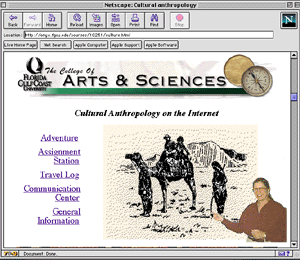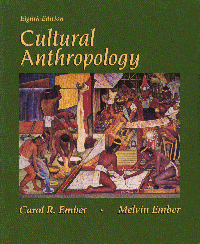
|
Course Evaluation Plan (Grading) |
|---|
Course DescriptionANT 3410 (CRN10251) - Cultural Anthropology - 3.00 credits This course is an introduction to human diversity as expressed through communities and ethnic groups worldwide. The goals for this course are to increase student appreciation of cultural differences and to develop a descriptive and critical understanding of cultural elements.
Course ObjectivesStudents will be able to
Teaching StrategiesMy teaching philosophy can be described as emphasizing discovery, interaction, and critical thinking. By discovery, I mean looking for the "Aha! Moment." For me, teaching represents an opportunity to launch a voyage of internal and external discovery by encouraging and challenging the individual to the thrill of life-long learning. Each student holds the potential to find, articulate, and synthesize ideas about the world around her or him. My role is to facilitate, guide, and nurture the curiosity and ability of the students. To emphasize interaction, I engage the students in debates, role playing, and presentations to enhance their communication skills. Students work in groups to discuss issues, draw conclusions, and offer solutions. Group work is displayed in poster sessions or in display cases at the end of the semester. Students actively engage in projects involving people from another culture. Finally, I encourage critical thinking through exams, essays, and class exercises. Students are taught analysis of text and materials using the scientific process to generate hypothesis, present evidence, and to synthesize their results into projections for the future, implications for the present, and patterning of culture from the past. In debates, I insist that students develop both sides of an argument and in oral debates, switch sides. I consider the ability to think critically to be major in examining old beliefs and stereotypes which ultimately leads to understanding.
Learning StrategiesTeaching and learning on the Web requires new skills and attitudes for both the instructor and the students. The tradition of the "sage on the stage" gives way to the "guide on the side" as learning becomes more student-centered and as students become more responsible for their own learning. The transition of learning from instructor-centered to student-centered will be smoother if learners know how to handle and manage their own learning. Self Direction and Personal Efficacy" provides a series of articles and references with ideas for teachers to offer more student-centered learning and ideas for students to set their own goals. Taking responsibility for your own learning is critical in distance learning. A touchstone of effective learning is that students are in charge of their own learning; essentially, they direct their own learning processes.
Required Textbook
Stearman, A.M. 1989. Yaqui: Forest Nomads in a Changing
World. NY.: Holt, Rinehart and Winston
Topic Outline
Use of Web-based or Electronic WebBoardsElectronic bulletin or message boards are simply computerized versions of the cork WebBoards with which we're all familiar. Just as with traditional message boards, users of electronic WebBoards may post new messages, read others' messages, and respond to others' messages. WWWBoard will be used in class for electronic discussions. Students are required to participate in class electronic discussions. In other words, they are required to post messages and reply to messages on the WebBoard.
Use of Web-based Chat RoomChat rooms allow you to "converse" electronically with other computer users who are online at the same time. Unlike e-mail, message boards, or mailing lists, chatting takes place in real time. It's like chatting on the phone, only instead of talking, you type. Your professor may use chatting for online class discussions, online small group discussions, or virtual office hours. A chat room is available for this class. Virtual office hours in the chat room and time for instructor-led chats will be announced/sent to students as soon as they are decidecd. Use of Student Portfolio |
|
Assignments |
Points |
|---|---|
|
Quizzes (14 quizzes, 20 points per quiz) |
280 points (28%) |
|
Essay (10 essays, 40 points per essay) |
400 points (40%) |
|
Class Participation (3 WebBoard postings per week) |
100 points (10%) |
|
Final analysis |
220 points (22%) |
Student Grade Sheet
Course Policies
Class participation is measured by students posting comments on the Travel Log or WebBoard each week.
No assignments will be accepted after the deadline.
Students must keep up with assignments as past class quizes will be removed each week.
Students may enter the Thursday night chat room (On-Line office hours) with the instructor if they have questions regarding the assignments or have any other questions.
When answering quiz questions, read the text, think about what has been said, then paraphrase the idea into your own words.
To copy more than three words of a text without adding parentheses or double indenting a block quote, is plagarism. If you want to repeat a special section of the text or other written material use parenthesis for a sentence or two. If you are quoting more than 2 sentences, then put the statement in double indents. Don't forget to cite author, year, and page number when you are quoting verbatim. Someone went to a lot of trouble to write the words, and they would like credit for being so brilliant. If what they were saying wasn't brilliant, you would write better anyway.
University Statements:
Academic Dishonesty/Cheating Policy:
"All students are expected to demonstrate honesty in their
academic pursuits. The university policies regarding issues
of honesty can be found under the "Student Code of Conduct"
on page 11, and under "Policies and Procedures" on pages 18
- 24. of the Student Guidebook . All students are expected
to study this document which outlines their responsibilities
and consequences for violations of the policy. "
Disability Accommodations Services:
Florida Gulf Coast University, in accordance with the Americans with Disabilities Act and the university's guiding principles, will provide classroom and academic accommodation to students with documented disabilities. If you need to request accommodation in this class due to a disability, or you suspect that your academic performance is affected by a disability, please see me or contact the Office of Multi Access Services. The Office of Multi Access Services is located in the Student Services building, room 214. The phone number is 590-7925 or TTY 590-7930.
Home | Adventure | Assignment Station | Communication | Information

